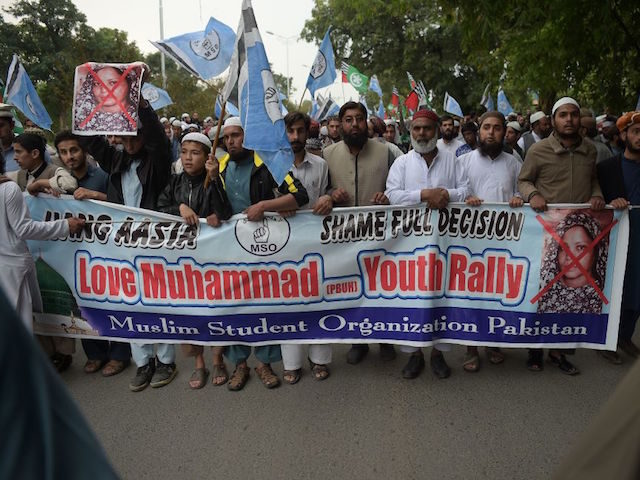Christian mother of five Asia Bibi, who spent nearly a decade on death row in Pakistan for blasphemy before authorities cleared her of any wrongdoing back in October 2018, will remain at an undisclosed government location this Easter.
Pakistani Prime Minister Imran Khan reportedly indicated this week that the country will not allow her to travel with her family to Canada, where they are living in exile after her acquittal triggered nationwide riots demanding their deaths.
The PM, however, offered a glimpse of hope for her relatives in Canada, telling reporters in Islamabad early this week, “I can assure you she is safe, and she will be leaving in weeks,” the Jerusalem Post reports.
He did not provide a specific date.
Despite being acquitted of blasphemy based on evidence that the highest court in Pakistan deemed “concoction incarnate” in October, authorities continue to hold her in an undisclosed location, allegedly in Karachi, the country’s most populous city.
Her upcoming release reportedly stems from her captors finally convincing her not to disparage Islamabad in the media after she is reunited with her family in Canada.
Until October 2018, Pakistan held Bibi on death-row since 2010 after charging her with committing blasphemy the previous year.
“Bibi’s husband, Ashiq Masih, has been holed up with Bibi since her acquittal. Her children, however, are currently residing in Canada, where the entire family has been granted asylum, the Christian Broadcasting Network (CBN) News pointed out,” adding:
Reports indicate that Bibi was initially held at an undisclosed location for her own safety, as radical Islamists sought to take justice into their own hands and hand down the execution that Pakistan’s Supreme Court ruled against.
However, it soon became apparent that the Pakistani government was seeking assurances from Bibi that she would not speak ill of her country in the media upon being released. Now, having likely secured these assurances, Bibi will be allowed to reunite with her family in Canada.
Canada vowed to ensure Bibi’s safety.
“The case of Asia Bibi is a priority for our government, and we are focused on ensuring the safety of her and her family,” a spokesperson for Canada’s Global Affairs Department, told Faithwire, a component of CBN.
“Canada is prepared to do everything we can to ensure the safety of Asia Bibi. We urge the Government of Pakistan to take all necessary steps to keep her safe,” the spokesperson added. “Freedom of religion is a fundamental human right, and must be fully respected.”
Pakistan’s controversial blasphemy law — disproportionately used to target Christians and other religious minorities — makes insulting Islam a crime punishable by life imprisonment or death depending on the perceived severity of the offense.
Judges have sentenced many convicted blasphemers to death, but the country has yet to carry out an execution. Nevertheless, Islamists are known to take their version of justice into their own hands, sometimes to fatal ends
Early this year, Pakistan’s Supreme Court dismissed a final petition to appeal the acquittal of Bibi, effectively setting the Christian mother free. However, she remains stuck in Pakistan.
This month, British Foreign Secretary Jeremy Hunt revealed that the United Kingdom Parliament was negotiating Bibi’s freedom.
Hunt reportedly told lawmakers:
Making sure that she is safe and has somewhere safe to go is a top priority for this government. We have had numerous discussions in private with [the] Pakistani government about how to progress on this. We are making progress, and I’m very hopeful that this will have a positive outcome.
The U.S. Department of State’s (DOS) latest report on human rights in Pakistan, which covers 2018, noted that courts in the Muslim-majority country continue to protect the rights of religious minorities.
“Courts discriminatorily used laws prohibiting blasphemy against Shia, Christians, Ahmadis, and members of other religious minority groups. Lower courts often did not require adequate evidence in blasphemy cases, and some convicted persons spent years in jail before higher courts eventually overturned their convictions or ordered their release,” it added.

COMMENTS
Please let us know if you're having issues with commenting.